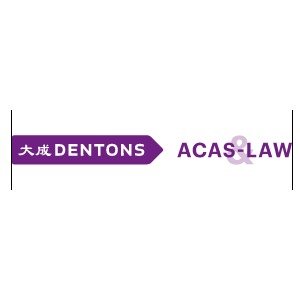Best Media, Technology and Telecoms Lawyers in Nigeria
Share your needs with us, get contacted by law firms.
Free. Takes 2 min.
Or refine your search by selecting a city:
List of the best lawyers in Nigeria
Legal guides written by Adeola Oyinlade & Co:
- Procedure and Requirements for Work Permit and Visas in Nigeria
- The Step-By-Step Procedure of How to Apply for Microfinance Bank License Online in Nigeria
- How to Ensure the Smooth Recognition and Enforcement of Foreign Judgments in Nigeria
Nigeria Media, Technology and Telecoms Legal Articles
Browse our 1 legal article about Media, Technology and Telecoms in Nigeria written by expert lawyers.
- Telecommunication Services in Nigeria: The Available Legal Rights and Remedies to Customers (Subscribers)
- Telecommunications services are essential to modern society, which facilitates global communication, business, and connectivity. In recent years, Nigeria's telecommunications business has developed and expanded greatly, owing to technology breakthroughs and regulatory reforms. However, in addition to these advancements, consumers frequently face issues such as network congestion, call dropouts, and insufficient... Read more →
About Media, Technology and Telecoms Law in Nigeria
The Media, Technology, and Telecoms (MTT) industries in Nigeria have been experiencing rapid growth, driven by increasing innovation and digital transformation. These industries are crucial to Nigeria's economy, providing significant contributions to GDP and employment. MTT laws in Nigeria aim to regulate the diverse activities within these sectors, ensuring compliance, security, and ethical practices. Regulations encompass broadcasting, telecommunication network operations, data protection, digital communication, and the use of technology in business processes.
Why You May Need a Lawyer
Navigating the complex legal landscape of the MTT sectors in Nigeria can be challenging. People may need legal assistance in various situations, such as:
- Ensuring compliance with telecommunications regulations for startups or established companies.
- Dealing with disputes over intellectual property rights in digital content creation and distribution.
- Advising on data protection and privacy laws, particularly with the enforcement of the Nigeria Data Protection Regulation (NDPR).
- Negotiating licensing agreements for media or tech products and services.
- Addressing issues related to digital fraud or cybercrime.
- Resolving contract disputes between technology providers and users.
- Assisting in the regulatory approval process for new media or technology services.
Local Laws Overview
The legal framework governing Media, Technology, and Telecoms in Nigeria comprises several key pieces of legislation, including:
- Nigerian Communications Act (2003): This Act regulates the telecommunications sector and established the Nigerian Communications Commission (NCC), which oversees industry compliance and promotes fair competition.
- Nigeria Broadcasting Code: This regulates broadcasting services, focusing on content, ownership, and ethical standards for broadcasters.
- Cybercrimes (Prohibition, Prevention, Etc) Act (2015): This law addresses cybercrime, providing legal measures to prevent internet fraud, hacking, and other forms of cyber offenses.
- Nigeria Data Protection Regulation (2019): NDPR sets out guidelines for data protection, ensuring the privacy rights of individuals and the processing of personal data within Nigeria.
- Intellectual Property Laws: These laws protect the rights of creators and inventors in the media and tech spaces, covering copyrights, patents, and trademarks.
Frequently Asked Questions
What is the NCC and what is its role?
The Nigerian Communications Commission (NCC) is the regulatory body for the telecommunications sector in Nigeria. Its responsibilities include licensing operators, managing telecommunications resources, and ensuring compliance with industry regulations.
How does the NDPR affect businesses?
The NDPR requires businesses to handle personal data responsibly, implementing measures to protect data privacy and security. Companies must register with the National Information Technology Development Agency (NITDA) and ensure they comply with data processing requirements.
What legal protections exist for digital content creators?
Digital content creators in Nigeria are protected under the Copyright Act, which grants creators exclusive rights to their works and the ability to take legal action against infringement.
How are disputes in the tech industry typically resolved?
Disputes may be resolved through negotiation, mediation, arbitration, or litigation, depending on the nature of the dispute and the agreements in place between parties.
What is required to start a broadcasting service in Nigeria?
To start a broadcasting service, one must obtain a license from the National Broadcasting Commission (NBC) and comply with the Nigeria Broadcasting Code, which sets standards for operations and content.
Are there specific regulations for online businesses?
Online businesses must comply with general business regulations and sector-specific laws, such as the NDPR for data protection and e-commerce guidelines provided by regulatory bodies.
How does Nigeria combat cybercrime?
The Cybercrimes Act provides the legal framework for combating cybercrime in Nigeria, outlining offenses and penalties, and empowering law enforcement agencies to investigate and prosecute offenders.
What is the impact of intellectual property laws on technology innovation?
Intellectual property laws protect inventors and innovators, promoting technology development by granting exclusive rights to the creators of patents, trademarks, and designs, fostering a supportive environment for innovation.
Can foreign companies operate in Nigeria's telecom sector?
Foreign companies can operate in Nigeria's telecom sector but must comply with local regulations and obtain relevant licenses from the NCC to ensure lawful operations.
How does the government support the tech industry?
The Nigerian government supports the tech industry through policies promoting digital innovation and skill development, alongside initiatives such as technology incubation centers and grants for tech startups.
Additional Resources
Below are some resources and organizations that can be helpful:
- Nigerian Communications Commission (NCC): Oversees the telecommunications industry.
- National Broadcasting Commission (NBC): Regulates broadcasting services.
- National Information Technology Development Agency (NITDA): Responsible for implementing policies that promote IT development.
- Cybercrime Prevention and Detection Agency: Works to combat cybercrime and enforce cybersecurity laws.
- Nigerian Copyright Commission (NCC): Protects and enforces intellectual property rights.
- Digital Rights Lawyers Initiative (DRLI): An organization focused on digital rights advocacy and protection.
Next Steps
If you require legal assistance in Media, Technology, and Telecoms, consider the following steps:
- Identify the specific area of concern and gather relevant documentation.
- Research and consult with attorneys specializing in MTT law to understand your legal options.
- Evaluate the credibility and experience of potential lawyers to ensure they have relevant expertise.
- Discuss your case with your selected lawyer and develop a strategy tailored to your needs.
- Stay informed about changing regulations and developments within the industry to ensure ongoing compliance.
Lawzana helps you find the best lawyers and law firms in Nigeria through a curated and pre-screened list of qualified legal professionals. Our platform offers rankings and detailed profiles of attorneys and law firms, allowing you to compare based on practice areas, including Media, Technology and Telecoms, experience, and client feedback.
Each profile includes a description of the firm's areas of practice, client reviews, team members and partners, year of establishment, spoken languages, office locations, contact information, social media presence, and any published articles or resources. Most firms on our platform speak English and are experienced in both local and international legal matters.
Get a quote from top-rated law firms in Nigeria — quickly, securely, and without unnecessary hassle.
Disclaimer:
The information provided on this page is for general informational purposes only and does not constitute legal advice. While we strive to ensure the accuracy and relevance of the content, legal information may change over time, and interpretations of the law can vary. You should always consult with a qualified legal professional for advice specific to your situation.
We disclaim all liability for actions taken or not taken based on the content of this page. If you believe any information is incorrect or outdated, please contact us, and we will review and update it where appropriate.
Browse media, technology and telecoms law firms by service in Nigeria
Nigeria Attorneys in related practice areas.
Browse media, technology and telecoms law firms by city in Nigeria
Refine your search by selecting a city.

















